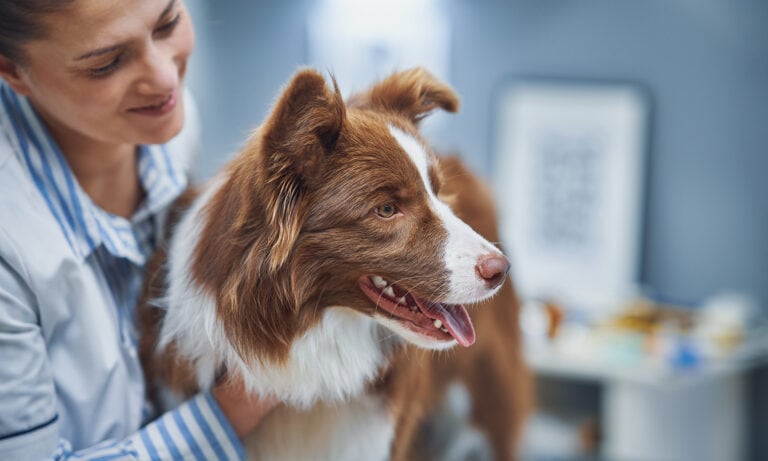In This Guide
What Is Leptospirosis in Dogs?
Leptospirosis is a disease that’s caused by infection with Leptospira bacteria, also referred to as leptospires. It's part of a group of bacteria called spirochete, which also includes the bacteria that are responsible for illnesses like syphilis and Lyme disease. (Leptospira itself does not cause these diseases, however.)
Though it is most often diagnosed in dogs who are over 2 years old, it can impact puppies more significantly if they should catch it. It’s also a disease that can affect humans, which means your dog can pass it on to you if they become infected.
“The bacteria are typically spread through the urine of infected animals, as well as contaminated water sources, soil or food,” notes Dr. Andrea Johnston, DVM, a board-certified small-animal veterinary internist based in Minnetonka, Minnesota, and medical board member at The Vets.
Symptoms include:
- Lethargy
- Vomiting
- Decreased appetite
- Diarrhea
- Fever
- Bruising
- Edema (swelling of the limbs or abdomen)
- Bleeding from the gums
- Blood in the urine, stool or nose
- Jaundice
If your dog contracts leptospirosis, it’s considered a medical emergency.
Dr. Sarah Wooten, DVM, veterinarian and certified veterinary journalist in Silverthorne, Colorado, says that infected dogs and people can develop fatal liver failure or kidney (renal) failure and are very infectious to other dogs and people.
How Common Is Leptospirosis in Dogs?
Leptospirosis flourishes during warm and wet times of the year, and is particularly common in warm climates with high annual rainfall. Areas that are considered a hotspot for leptospirosis include the midwestern, southwestern and eastern regions of the United States. But it can occur anywhere—especially after heavy rainfall and flooding—according to the American Veterinary Medical Association.
In the past, leptospirosis in dogs was primarily seen in canines who lived in rural areas, wet areas, farms or areas with wildlife/rodent traffic. However, in recent years “the main risk factors for leptospirosis have changed, and now include unvaccinated dogs, small-breed dogs and even dogs that live in urban areas,” Dr. Wooten notes.
Fortunately, leptospirosis tends to have a short shelf life and doesn’t live in the environment very long. If you are walking your dog by streams, rivers or puddles, don’t let your dog drink the flowing or standing water. This minimizes the chances of contracting lepto (as well as the microscopic parasite giardia) from the river.

What Is the Leptospirosis Vaccine?
The 4-serovar leptospirosis vaccine is an effective preventive measure that helps keep dogs from contracting this fatal infection. “The vaccine is usually administered as a series of initial shots, followed by annual booster shots to maintain immunity,” Dr. Johnston says.
How Does the Lepto Vaccine Work?
This is a “killed vaccine,” meaning it contains inactivated bits of lepto bacteria. If the concept makes you feel nervous, it may help to know that the leptospirosis vaccine is no more reactive than a common rabies vaccine, Dr. Wooten notes.
“The bacterium [in the vaccine] does not cause the disease and has a less strong and shorter immune response than [diluted] vaccines,” adds Dr. Becca Boronat, DVM, a Charleston, South Carolina-based veterinarian at Best Friends Animal Society, an animal welfare organization headquartered in Kanab, Utah. “This is why it’s so important to follow the administration schedule of initial two doses of vaccine two to four weeks apart and then yearly boosters.”
If you have a dog who is sensitive to vaccines, or a very small dog, ask your veterinarian about breaking up vaccines into multiple visits, so your dog has a chance to recover in between vaccines.
How Often Does a Dog Need a Lepto Booster?
Booster shots are necessary to ensure ongoing protection, says Dr. Johnston, as immunity can decline over time. Generally speaking, an annual booster is recommended. However, the frequency of booster shots may depend on the specific vaccine used, so it’s important to follow your veterinarian’s recommendations.
Pros and Cons of Leptospirosis Vaccine
The biggest benefit of giving your pup a canine leptospirosis vaccine is that it prevents them from contracting this harmful and even deadly infectious disease. That, in and of itself, provides great peace of mind for pet parents.
“It is very difficult to control leptospirosis in your environment if you have a yard, as it is carried by wildlife,” says Dr. Wooten. “The best way to protect your dog against leptospirosis and leptospirosis symptoms is to have him receive the leptospirosis vaccine as a puppy, and then have him vaccinated annually after that.”
Another benefit of the lepto vaccine is that you can help prevent greater outbreaks in your home or area. Remember, leptospirosis is very contagious and is easily spread between dogs and even to humans.
What’s the downside? For many dogs, not much. One drawback associated with the leptospirosis vaccine is that, rarely, some dogs do experience some mild vaccine reactions.
Lepto Vaccination Side Effects
Dr. Johnston says that, as with any vaccine, there may be mild side effects, such as:
- Soreness at the injection site
- Lethargy
- Temporary loss of appetite
- A mild fever
Serious adverse reactions are very rare, but they can occur. Pet parents should monitor their dog for any unusual reactions and consult their veterinarian if they have concerns, Dr. Johnston says.
“If you have spent any time searching the Internet, then you will likely notice there is still a prevailing belief that the leptospirosis vaccine has a high reaction rate,” adds Dr. Wooten. “In the past, this was true—the vaccine seemed to cause adverse reactions in a number of dogs, including vomiting, loss of appetite, lethargy and, sometimes, hives.”
Fortunately, she says, science has progressed, and the new lepto vaccine for dogs has a very low reaction rate.
Is the Lepto Vaccine Necessary for Dogs?
Unlike rabies or parvovirus vaccines, the leptospirosis vaccine is currently not considered a “core vaccine” by the American Animal Hospital Association (AAHA). However, if you live in a hotspot or if your dog spends any amount of time outdoors or at a kennel, then the lepto vaccine can help keep your pet free from this disease and provide great peace of mind.
“Vaccination for the prevention of leptospirosis should be strongly considered for dogs in the United States, as this disease can be life-threatening and is zoonotic,” says Dr. Boronat. (A zoonotic disease is a disease or infection that can be transmitted naturally from animals to humans or from humans to animals.)
Dr. Johnston agrees, adding that vaccination not only protects your individual dog and the rest of your family, but also the community at large.
“These days, thanks to urban sprawl and fragmentation of wildlife areas, city dogs and dogs that live in purses are at risk, and the disease risk is growing,” Dr. Wooten says. “I practice in a Colorado town of 100,000 people, and veterinarians in our clinic have diagnosed several cases of lepto, including a Yorkie that lives in a purse and hardly ever touches the ground. We would have never suspected leptospirosis in these patients if we hadn’t been testing for the disease.”
Leptospirosis Vaccine Cost
Lepto vaccine costs vary from clinic to clinic and depend on your location. Generally speaking, though, you can expect to pay anywhere from $15 to $50 for each shot. Keep in mind that this vaccine requires a series of shots and routine boosters, so you’ll need to visit your veterinarian according to their recommended schedule to ensure the vaccine works to its full potential.
FAQs About the Leptospirosis Vaccine
Q:
Where is the lepto vaccine given in dogs?
Q:
How do dogs get leptospirosis?
Q:
What are leptospirosis symptoms in dogs?
While taking care of our sweet canines means spoiling them with lots of cuddles and giving them plenty of attention, treats and proper training, it also means staying on top of their health—just like we do our own. This includes administering vaccines that help keep them in tip-top shape. When in doubt, speak to your veterinarian about whether your pup should receive the lepto vaccine. Find out more about vaccines for dogs.
Expert insights provided by Dr. Andrea Johnston, DVM, a board-certified small-animal veterinary internist and medical board member at The Vets in Minnetonka, Minnesota; Dr. Sarah Wooten, DVM, veterinarian and certified veterinary journalist in Silverthorne, Colorado; and Dr. Becca Boronat, DVM, a board-certified veterinarian with Best Friends Animal Society in Charleston, South Carolina.
More Ways to Protect Your Pup
Share:









